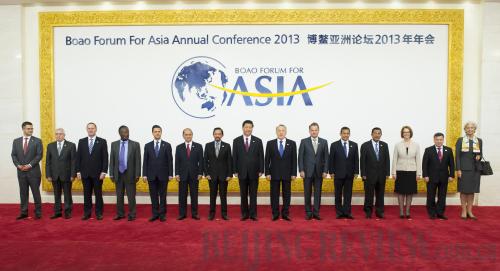|
 |
|
GATHERING OF MINDS: National leaders and heads of international organizations pose for photos at the Boao conference (LI XUEREN) |
First, China should make more effort to better distribute its wealth by increasing residents' income. Second, a better social welfare and security system should be built to make people feel secure enough to spend. Finally, more incentives should be given to consumption in rural areas. "Without stirring up consumption of the country's 740 million rural residents, China's domestic consumption can never be a pillar for economic growth," he said.
Online shopping and credit consumption have become two driving forces to increase spending at home, said experts. There had been about 242 million online shoppers in China by the end of 2012, an increase of 25 percent over the previous year, according to the China Internet Network Information Center.
Emarket, a U.S. research company, said online sales in China were worth $181.6 billion last year.
In China's first-tier cities such as Beijing and Shanghai, the yearly spending of each online shopper averaged 6,819 yuan ($1,101), accounting for 18 percent of the person's total disposable income, according to a report by McKinsey Global Institute, the research arm of global management consulting firm McKinsey & Co. China's e-tailing market may reach $420 billion to $650 billion in sales by 2020, according to the report.
Online shopping has a clear incremental effect on overall consumption, and could raise private consumption by an extra 4 to 7 percent by 2020, said Chen Yougang, one of the authors of the report.
"China's young generation is quite familiar with digital products and has been fully exposed to the Internet world since they were born. We should provide more e-commerce channels for them to get to know our brand and then purchase our products online," said Pepsi President Abdalla.
Another means to boost consumption is the credit card. Ma Weihua, President and CEO of the China Merchants Bank, said that credit consumption will play a pivotal role in shoring up spending.
"China now has 330 million credit cards, with an annual increase of 20 percent. China Merchants Banks has issued 40 million to 50 million of them, and the credit card business is spiraling up," he said.
"When I first considered developing the credit card business, many people wanted to talk me out of it. Luckily, I didn't listen to them. We estimated that it would take eight years before the business turned a profit. It turns out it only took four," Ma added.
Manufacturing hollowing-out?
Over the past several years, some China-based manufacturers have shifted production to regions with cheaper labor and land costs, like Southeast Asia. Meanwhile, developed countries like the United States have called on their companies to bring manufacturing jobs back home. As a result, concerns are rampant over the hollowing-out of China's manufacturing sector.
In the eyes of Justin Yifu Lin, former World Bank chief economist, industrial transfer is a common phenomenon.
In the 1960s when Japan was in the midst of its economic ascent, the Japanese moved labor-intensive industries to the four Asian Tigers—Singapore, South Korea, Taiwan and Hong Kong—and helped them realize industrialization. In the 1980s, the "tigers" followed suit and moved industries to the Chinese mainland. Now, it is China's turn, Lin said.
Dong Mingzhu, Board Chairman of Gree Electric Appliances, Inc. of Zhuhai, said that the fundamental reason for the hollowing-out of the manufacturing sector is a lack of core technology.
"Companies that were hit most from the 2008 financial crisis were original equipment manufacturers. They don't have a brand, or any key technology in what they produce. When those companies were built in the first place, their founders were too short-sighted to make any long-term plans," said Dong, during a roundtable on the hollowing-out of China's manufacturing sector.
"As long as you have core technology, you'll be fine," she said, noting that Gree is now Brazil's largest air conditioner producer after founding a factory using refined technology 10 years ago.
Lin Zuoming, Board Chairman of Aviation Industry Corp., agreed.
"Economic globalization itself is a process whereby industrial chains break into fragments and are scattered in different regions," said Lin.
"Some lower-end manufacturing businesses transferring out of China is a positive change, as long as we keep higher-end manufacturing businesses and their core technologies."
Hu Zhenyu, Vice President of the China Fortune Land Development Co. Ltd., an expert in investment and the operation of industrial parks in China, said that local governments are quite cautious and rational when selecting which industries to develop. Lower value-added industries are not welcome in most regions, he said.
"As the resources in coastal regions are more and more scarce, it's totally understandable that some industries will shift to China's inland regions, or even to other countries. Doing so can prepare the way for industrial upgrade along the coast," he said.
| 